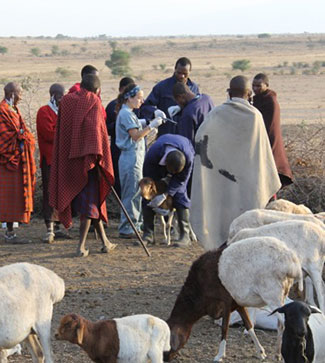Scientists in Tanzania show bacterial zoonoses, not malaria, often the cause of febrile diseases
November / December 2020 | Volume 19, Number 6

Photo by Dr. Jo Halliday, University of Glasgow test
Fogarty funded researchers in Tanzania studied causes of
diseases that produce fevers, to reduce unnecessary treatment
of false diagnoses of malaria.
Fevers are often assumed to be a sign of malaria in Africa - where precise tests for disease diagnosis may not be available. If left untreated, malaria can sometimes progress rapidly and even cause death. Yet, in Tanzania’s mountainous regions, other febrile diseases may cause dangerous illness as well.
While studying HIV/AIDS coinfections in the east African country, Fogarty grantee Dr. John Crump came across patients who were admitted to hospitals with severe fever. When they were tested for malaria, only 1-to-2% were positive, said Crump, a faculty member at University of Otago and Duke University.
“When we looked at the causes of fever, we started to realize how important bacterial zoonoses were as a cause of febrile illness,” Crump said. Not only do these diseases affect human health but they also have economic implications. If animals are sick, they may produce less milk, suffer pregnancy loss and the young may fail to grow normally.
Many Tanzanians raise small quantities of goats and poultry at home. “At one end of the spectrum you’ve got pastoralists, like the Maasai, who live a nomadic lifestyle in very close association with large mixed herds of cattle, sheep and goats. They have the most intense contact with animals and so have the highest disease risk and the greatest dependence on livestock for their livelihoods,” explained Crump. Meanwhile, smallholder farmers seen around the city of Moshi tend not to extensively graze their small herds, keeping them relatively unexposed to other animals.
Crump formed a team of researchers to better understand the underlying issues and answer questions including: What do primary care practitioners believe to be causes of fever? What do they know of bacterial zoonoses? What do district veterinary offices and other livestock sector communities understand about infections?
“It made sense that social science was needed to shed light on those topics,” said Crump. “One Health is a way of working with people from various disciplines in human, animal and environmental health that fits perfectly with the kinds of research questions we face in Tanzania.”
He and his team established a surveillance project to track three zoonotic diseases: leptospirosis, Q fever and brucellosis. The work included estimating disease burden, studying clinical approaches, researching risk factors to determine prevention strategies and testing diagnostics. Practical tasks included literature reviews, patient surveys and statistical analyses. Crump and his team published about 30 journal articles during the project. In one paper, brucellosis was determined to be endemic in northern Tanzania, with 35 cases per 100,000 persons. Another article outlined the etiology, epidemiology, clinical presentation, diagnosis, treatment and prevention of brucellosis, leptospirosis, Q fever and rickettsioses.
All told, Crump believes the project’s greatest impact has been unmasking the concurrent problems of malaria overdiagnosis and the underdiagnosis of non-malaria infections, including bacterial zoonoses, while pushing patient management toward new approaches for those without malaria. “We’re seeing less empiric treatment for malaria - more withholding of antimalarials if there’s a negative malaria diagnostic test - and consideration of alternative causes of severe fever. Hopefully that’s resulting in better outcomes for patients,” said Crump.
Additional results have also “flowed out of the research,” said Crump, who points to the “Not Every Fever is Malaria” campaign. “The WHO malaria treatment guidelines have also changed - I can’t say we’re entirely responsible for that - but the guidelines now say do a test for malaria first and only use antimalarials if the test is positive.” This major policy shift likely took into account additional research by others as well as increased testing, still all of it “has confirmed that malaria overdiagnosis is not just a problem in Tanzania, but in many places that were once endemic for malaria but are no longer due to successful malaria control activities,” he said.
Crump considers improved infrastructure another significant outcome of his Fogarty work. “The training of Tanzanians and the capacity building for the research platform is possibly the most important thing,” he said. “It’s a long game, but ultimately the goal is for our Tanzanian partners to increasingly garner external support for their research.”
More Information
To view Adobe PDF files,
download current, free accessible plug-ins from Adobe's website.
Related Fogarty Programs
Related World Regions / Countries
Related Global Health Research Topics